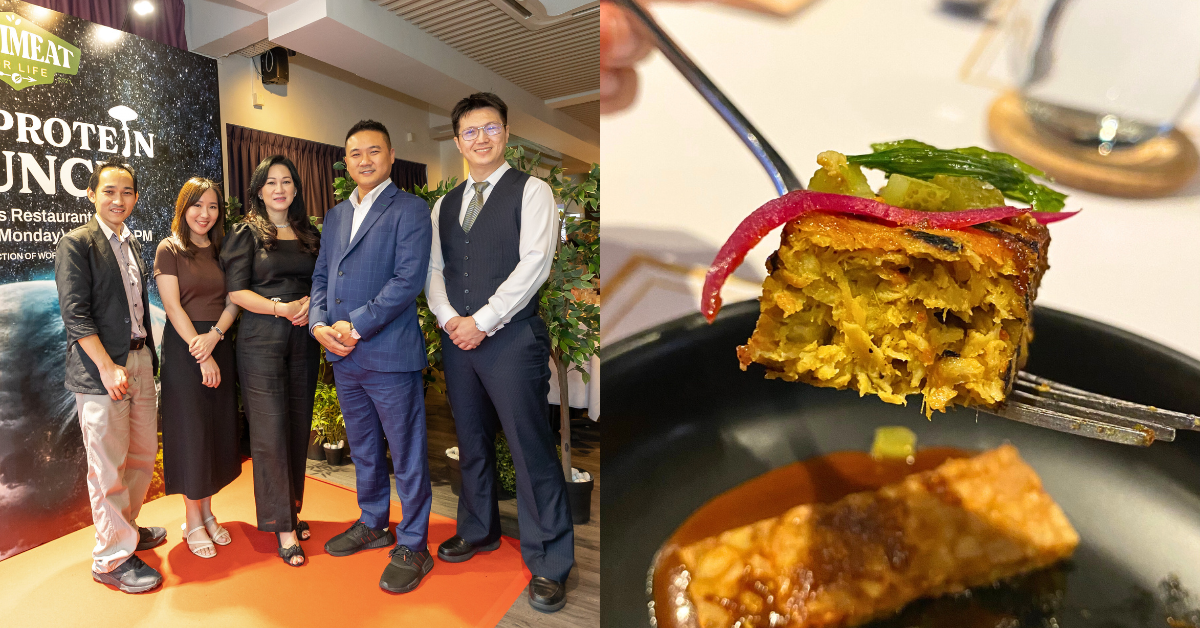Heading to Damansara on a Monday evening isn’t our usual routine, but that’s where we were on April 16. Neither the slight traffic nor the additional hours to our workday managed to quash our excitement and cheery mood.
Why?
Because we were off to the launch of Ultimeat’s new product called Ultimeat Mycoprotein at The Nimbus Restaurant. And as part of the intimate event, we were given the opportunity to dine and taste just how this new offering can be used to prepare a variety of exquisite dishes.
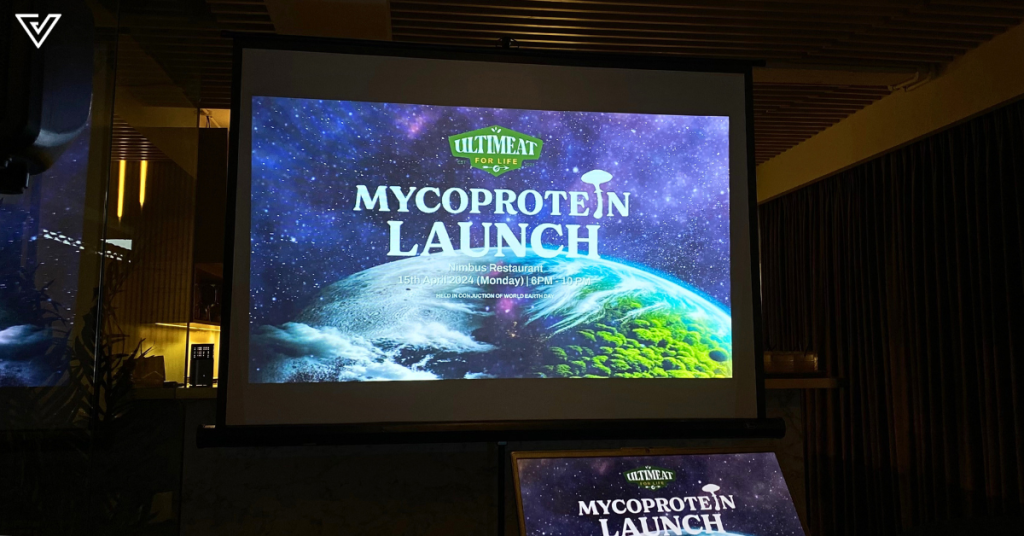
For context, mycoprotein is a type of protein derived from fungus, a category of living things that includes mushrooms.
This isn’t to be confused with regular mushrooms that you find in everyday dishes. Rather, mycoprotein production uses a technique called fermentation where harmless bacteria change its form over time.
Held in conjunction with World Earth Day happening on April 22, this new food item contributes to Ultimeat’s ongoing efforts to fight against climate change and promote sustainable food systems.
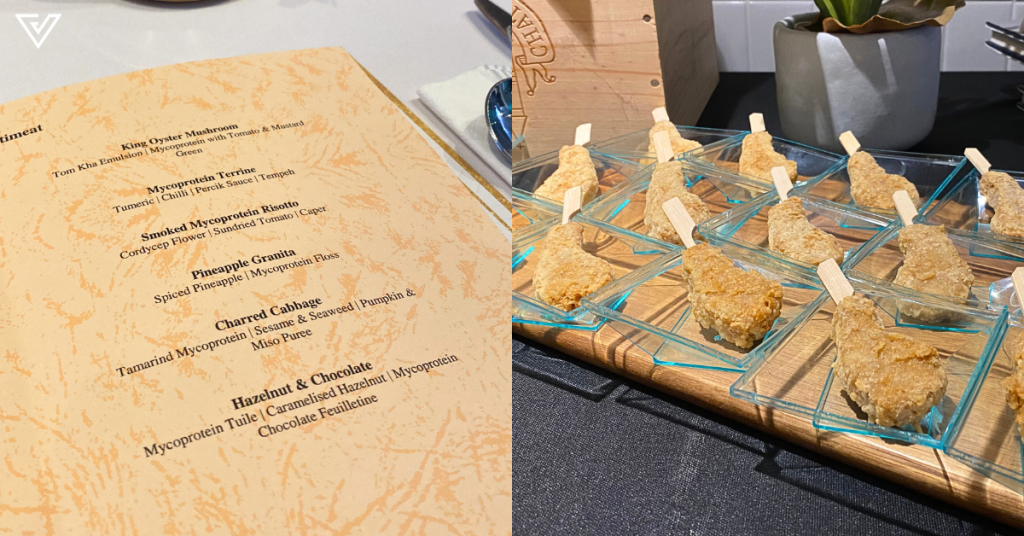
Speaking exclusively to Vulcan Post, the brand’s CTO, Yu-Wei Lin explained that this is a sustainable way of producing meat alternatives. “You can imagine [that] in the future, we don’t need to farm, we just need the [fermentation] tech. So [in] every city we can just build up a tank to produce mycoprotein.”
According to the brand, some benefits of mycoprotein are that it’s high in protein and fibre, and can be produced at faster rates with the use of biotechnology in a controlled environment.
Certified food scientist and co-founder of Ultimeat, Alfred Cheung, also wrote in The Sun that it contains low fat and sodium, and zero cholesterol.
So how does it actually taste?
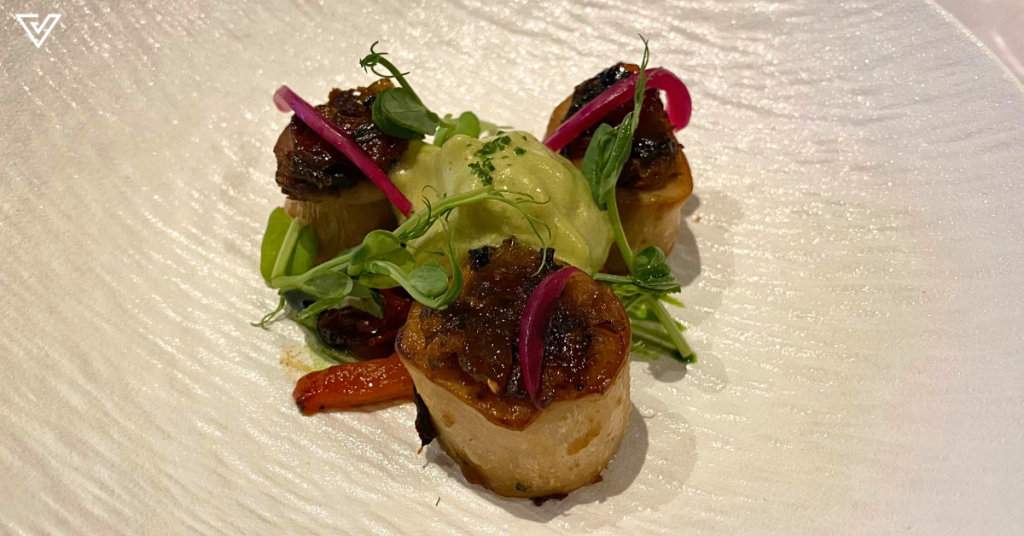
The menu we were served was a hearty curation of fusion dishes in decent-sized portions. A six-course meal with four starters, one main, and a dessert, both my colleague Claudia and I left the event feeling properly full.
The first dish of the night was King Oyster Mushroom paired with a Tom Kha Emulsion. The mushrooms were stuffed with shredded mycoprotein and layered with tomato and mustard green chutney.
Inspired by Thai flavours, it tastes like regular stuffed mushrooms, but I couldn’t really put a name to the texture. You can tell it’s not traditional meat but it doesn’t taste like soy-based meat either. Claudia remarked that it reminded her of scallops.
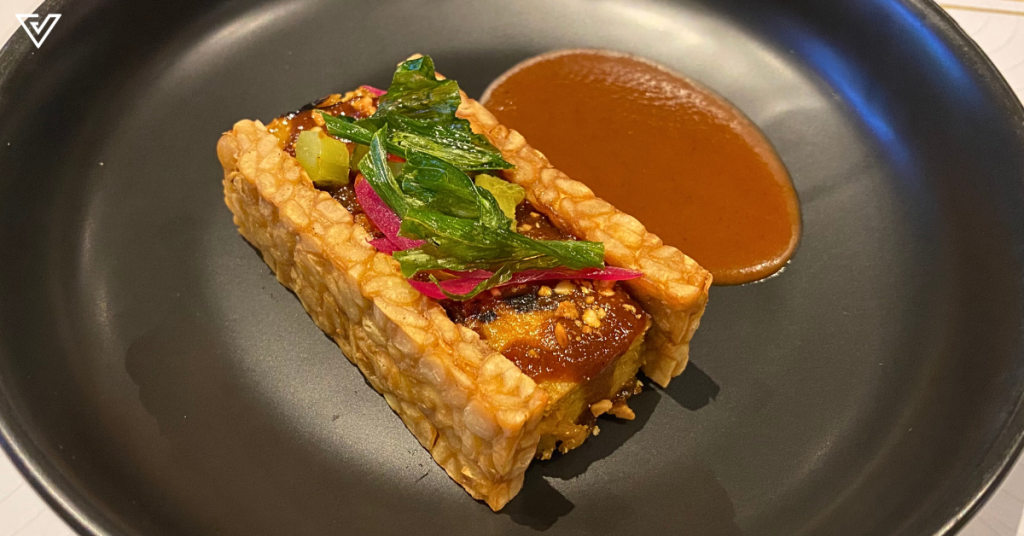
Next, we were served the Mycoprotein Terrine which is a rendition of satay and served with percik sauce and fried tempeh on the side. According to the chef behind these dishes and founder of Nimbus Restaurant, Chef Fred Choong, the terrine is made of 80% mycoprotein.
Taste-wise, it definitely lived up to its satay inspiration. I was pleasantly surprised to find that even in such large portions, the mycoprotein didn’t taste too rich (or for the lack of a better word, jelak).
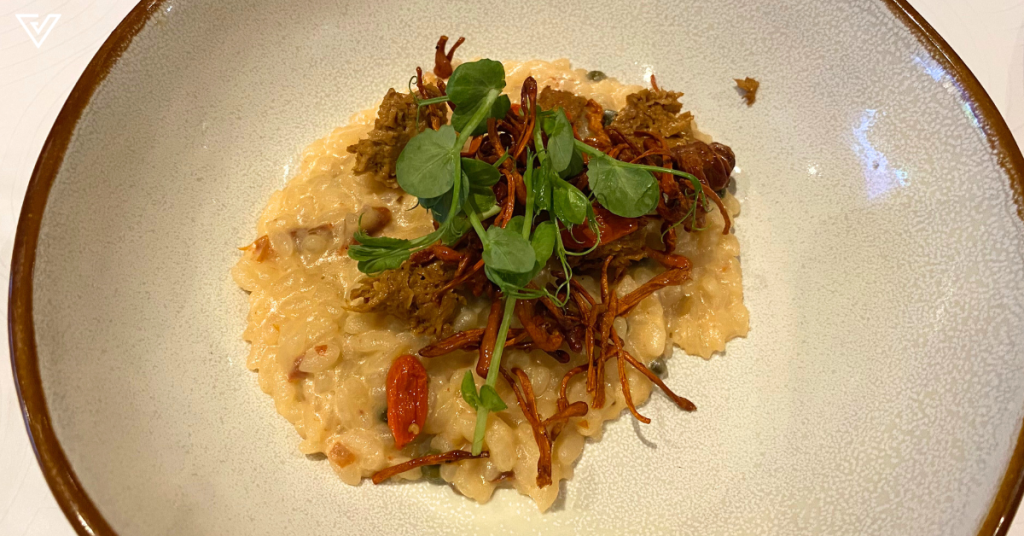
This was followed by Smoked Mycoprotein Risotto, a course that in my opinion, really allowed for the mycoprotein’s original taste to shine. And by that, I mean that it’s pretty bland in a good way because it showcases how it doesn’t have to be the main star.
The concept is like porridge where you’ll find small chunks of mycoprotein in each scoop. To give the dish more texture and flavour, it’s topped with fried cordyceps that have been tossed with truffle oil and soy base and candied goji berries.
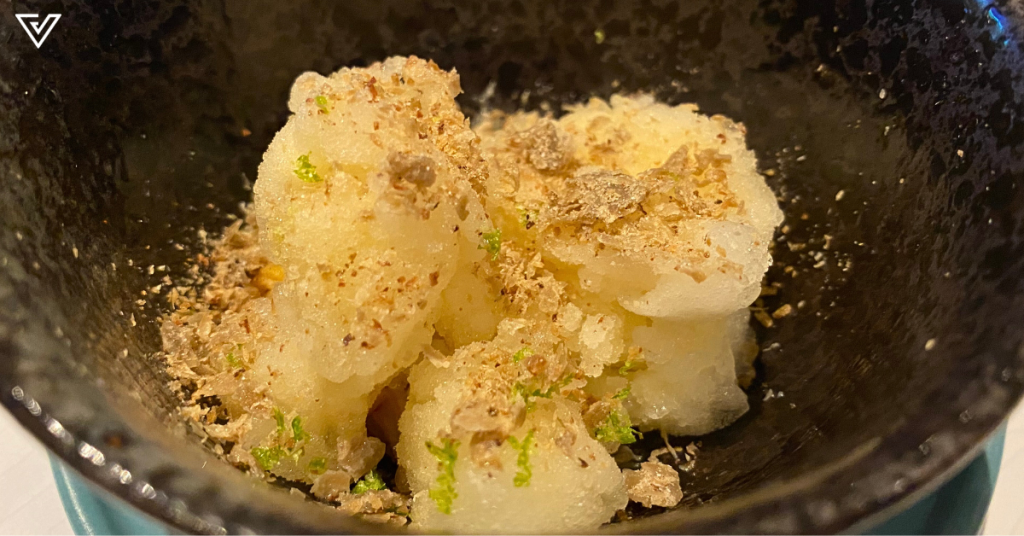
As a palate cleanser, Nimbus Restaurant whipped up a batch of Pineapple Granita. The mycoprotein came in the form of sprinkled floss meat and had a texture akin to serunding.
You wouldn’t think the elements would complement each other yet they oddly did. Though, Claudia didn’t find that the floss added much value to the overall taste, so to each their own.
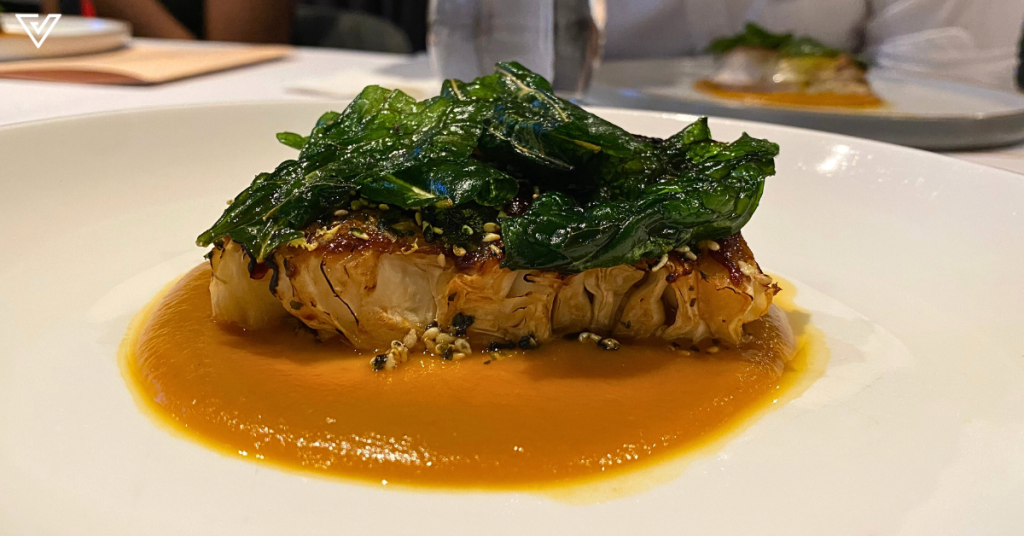
The main dish of the night was Charred Cabbage that was layered with minced mycoprotein that’s flavoured with tamarind paste in between. To make the dish less dry, it was served with miso and pumpkin puree.
Chef Fred leaned more towards Japanese flavours with this course but both Claudia and I found it to be our least favourite one. The use of minced mycoprotein might not have been the best choice for this. I’d wager that the texture would make it a better fit for something more robust like chilli con carne or kebabs.
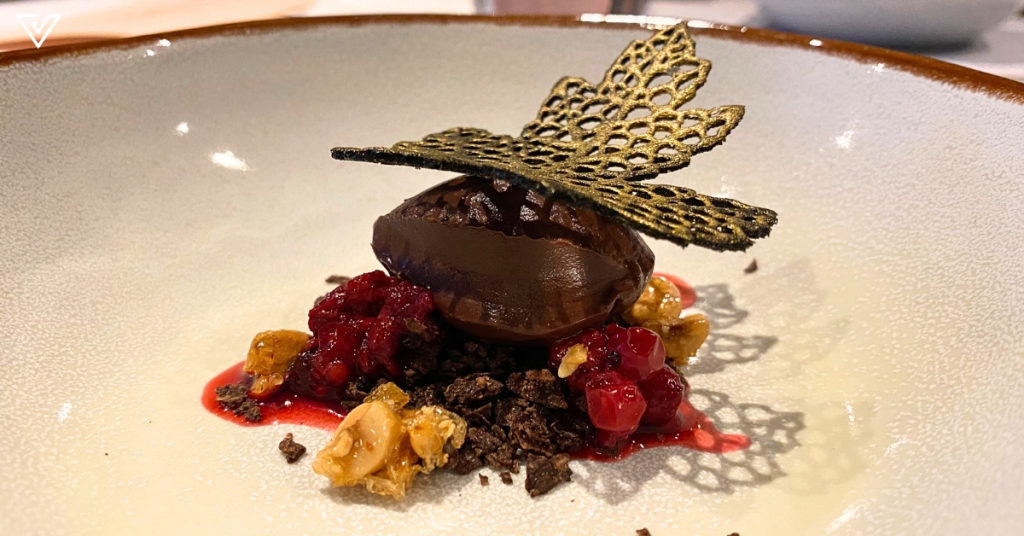
Saving the best for last, Nimbus Restaurant served us Hazelnut & Chocolate dessert. As its name suggests, the finale is hazelnut praline and chocolate mousse.
You wouldn’t be able to tell the dish had mycoprotein at first glance or first bite. But Chef Fred assured us that it was hidden in the golden leaf topping that is made of powdered mycoprotein. It’s also below the mousse in the form of dark chocolate-covered dehydrated mycoprotein.
Overall, the six-course meal exceeded our expectations and showed us just how versatile Ultimeat Mycoprotein could be.
A step forward in innovating the industry

Established in 2021, Ultimeat has been in the local meat-alternative industry for a few years now. But the founder is actually a third-generation practising vegetarian. Hence, he’s committed to producing plant-based food that delivers in terms of texture, taste, and nutritional value.
Prior to this, the brand was only offering vegetarian products made of plant and soy-based ingredients, such as its Plant-Based Burgers Patties. Ultimeat calls this its Food 2.0 endeavour.
Now, its shift into the mycoprotein industry is under the brand’s Food 3.0 initiative. Ultimeat’s founder and CEO, Edwin Lee, shared that they’re planning to transition fully to mycoprotein in the coming years.
With a focus on B2B clients, the company will be working with restaurants first to guide them on developing dishes.
This is kickstarted by its collaboration with Nimbus Restaurant to curate a limited-time menu (RM388+ per pax) featuring Ultimeat Mycoprotein. It’s only available from April 15 to May 15, 2024, and marks the debut of the brand’s meat alternative in Malaysia.
- Learn more about Ultimeat here.
- Read other articles we’ve written about Malaysian startups here.
Featured Image Credit: [From left] Sam Kin Kit (Bioengineering Manager at Ultimeat), Estella Goh (Operations Manager at Ultimeat), Melissa Ong (Group Chief Officer at Impact Circle), Edwin Lee (Founder & CEO at Ultimeat), Dr. Yu-Wei Lin (CTO in Bioengeering at Ultimeat) / Vulcan Post

